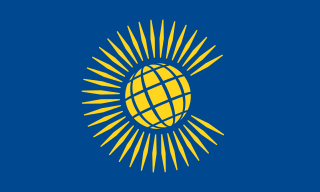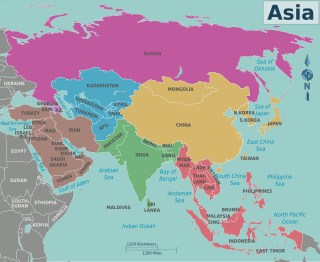
The globalAfrican diaspora is the worldwide collection of communities descended from people from Africa, predominantly in the Americas. The African populations in the Americas are descended from haplogroup L genetic groups of native Africans. The term most commonly refers to the descendants of the native West and Central Africans who were enslaved and shipped to the Americas via the Atlantic slave trade between the 16th and 19th centuries, with their largest populations in Brazil, the United States, and Haiti. However, the term can also be used to refer to African descendants who immigrated to other parts of the world consensually. Some scholars identify "four circulatory phases" of this migration out of Africa. The phrase African diaspora gradually entered common usage at the turn of the 21st century. The term diaspora originates from the Greek διασπορά which gained popularity in English in reference to the Jewish diaspora before being more broadly applied to other populations.

The Armenian diaspora refers to the communities of Armenians outside Armenia and other locations where Armenians are considered an indigenous population. Since antiquity, Armenians have established communities in many regions throughout the world. However, the modern Armenian diaspora was largely formed as a result of World War I, when the genocide which was committed by the Ottoman Empire forced Armenians who were living in their homeland to flee from it or risk being killed. Another wave of emigration started during the dissolution of the Soviet Union.

The Anglosphere is the Anglo-American sphere of influence, with a core group of nations that today maintain close political, diplomatic and military co-operation. While the nations included in different sources vary, the Anglosphere is usually not considered to include all countries where English is an official language, so it is not synonymous with the sphere of anglophones, though commonly included nations are those that were formerly part of the British Empire and retained the English language and English Common Law.

The British West Indies (BWI) were colonised British territories in the West Indies: Anguilla, the Cayman Islands, Turks and Caicos Islands, Montserrat, the British Virgin Islands, Antigua and Barbuda, The Bahamas, Barbados, Dominica, Grenada, Jamaica, Saint Kitts and Nevis, Saint Lucia, Saint Vincent and the Grenadines, British Guiana and Trinidad and Tobago. Other territories included Bermuda, and the former British Honduras.

Deportation is the expulsion of a person or group of people from a territory. The actual definition changes depending on the place and context, and it also changes over time. Forced displacement or forced migration of an individual or a group may be caused by deportation, for example ethnic cleansing, and other reasons. A person who has been deported or is under sentence of deportation is called a deportee.

Indian nationality law details the conditions by which a person holds Indian nationality. The two primary pieces of legislation governing these requirements are the Constitution of India and the Citizenship Act, 1955.
Since 1945, immigration to the United Kingdom, controlled by British immigration law and to an extent by British nationality law, has been significant, in particular from the Republic of Ireland and from the former British Empire, especially India, Bangladesh, Pakistan, the Caribbean, South Africa, Nigeria, Ghana, Kenya, and Hong Kong. Since the accession of the UK to the European Communities in the 1970s and the creation of the EU in the early 1990s, immigrants relocated from member states of the European Union, exercising one of the European Union's Four Freedoms. In 2021, since Brexit came into effect, previous EU citizenship's right to newly move to and reside in the UK on a permanent basis does not apply anymore. A smaller number have come as asylum seekers seeking protection as refugees under the United Nations 1951 Refugee Convention.
Transnationalism is a research field and social phenomenon grown out of the heightened interconnectivity between people and the receding economic and social significance of boundaries among nation states.

The Commonwealth Immigrants Act 1962 was an Act of the Parliament of the United Kingdom. The Act entailed stringent restrictions on the entry of Commonwealth citizens into the United Kingdom. Only those with work permits were permitted entry.

A Commonwealth citizen is a citizen of a Commonwealth of Nations member state. Most member countries generally do not treat citizens of other Commonwealth states any differently from foreign nationals, but do grant limited citizenship rights to resident Commonwealth citizens. For example, in 14 member states, resident non-local Commonwealth citizens are eligible to vote in elections. The status is most significant in the United Kingdom, and carries few or no privileges in many other Commonwealth countries.

According to the 2021 Canadian census, immigrants in Canada number 8.3 million persons and make up approximately 23 percent of Canada's total population. This represents the eighth-largest immigrant population in the world, while the proportion represents one of the highest ratios for industrialized Western countries.

Immigration is the international movement of people to a destination country of which they are not usual residents or where they do not possess nationality in order to settle as permanent residents. Commuters, tourists, and other short-term stays in a destination country do not fall under the definition of immigration or migration; seasonal labour immigration is sometimes included, however.

The history of immigration to Canada details the movement of people to modern-day Canada. The modern Canadian legal regime was founded in 1867, but Canada also has legal and cultural continuity with French and British colonies in North America that go back to the 17th century, and during the colonial era, immigration was a major political and economic issue with Britain and France competing to fill their colonies with loyal settlers. Until then, the land that now makes up Canada was inhabited by many distinct Indigenous peoples for thousands of years. Indigenous peoples contributed significantly to the culture and economy of the early European colonies to which was added several waves of European immigration. More recently, the source of migrants to Canada has shifted away from Europe and towards Asia and Africa. Canada's cultural identity has evolved constantly in tandem with changes in immigration patterns.

European emigration is the successive emigration waves from the European continent to other continents. The origins of the various European diasporas can be traced to the people who left the European nation states or stateless ethnic communities on the European continent.

Overseas Indians, officially Non-Resident Indians (NRIs) and People of Indian Origin (PIOs) are Indians who reside or originate outside of India. According to the Government of India, Non-Resident Indians are citizens of India who currently are not living in India, while the term People of Indian Origin refers to people of Indian birth or ancestry who are citizens of countries other than India. Overseas Citizenship of India (OCI) is given to People of Indian Origin and to persons who are not People of Indian Origin but married to Indian citizen or People of Indian Origin. Persons with OCI status are known as Overseas Citizens of India (OCIs). The OCI status is a permanent visa for visiting India with a foreign passport.

The South Asian diaspora, also known as the Desi diaspora, is the group of people whose ancestral origins lie in South Asia, but who live outside the region. There are over 44 million people in this diaspora.
Zimbabwean Canadians are Canadian citizens of Zimbabwean descent or a Zimbabwe-born person who resides in Canada. According to the Canada 2016 Census there were 16,225 Canadian citizens who claimed Zimbabwean ancestry and 15,000 Zimbabwean citizens residing in the country at the moment of the census.
Southeast Asians living in the United Kingdom have been present in the country for several centuries, arriving from Southeast Asia, and primarily originating from countries and territories such as the Philippines, Malaysia, Indonesia, Burma, Singapore, Thailand and Vietnam.

The Asian diaspora is the diasporic group of people whose ancestral origins lie in Asia, but who live outside of the continent. There are several prominent groups within the Asian diaspora.

Immigration has had a major influence on the demographics and culture of the Western world. Immigration to the West started happening in significant numbers during the 1960s and afterward, as Europe made its post-war economic recovery and the United States passed the Immigration and Nationality Act of 1965 allowing non-European immigration.














